#also theon
Text
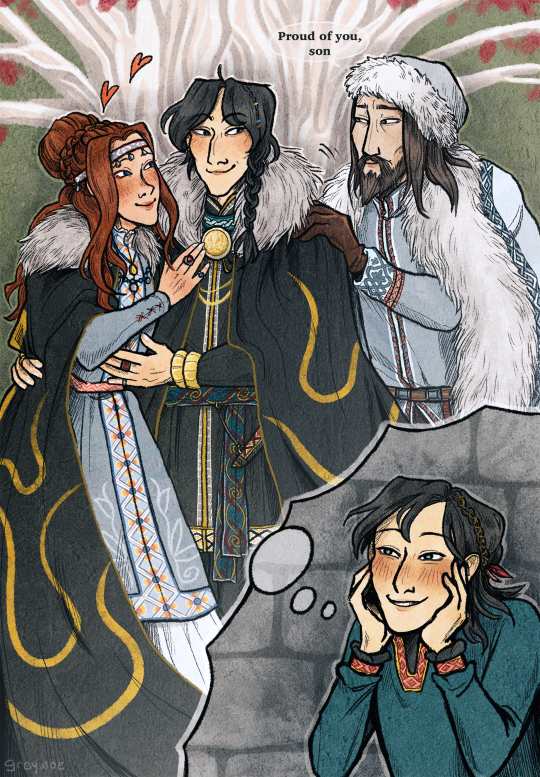

child ward in search of belonging indulges in juvenile fantasies as a coping mechanism. sad!
#my drawings#asoiaf#asoiaf fanart#theon greyjoy#not tagging the others bc they’re products of his imagination#so @ their fans: dw they’re not real…….#well i mean they’re not real anyway but as in a portrayal of their canon selves etc#this has been finished for so long but i debated whether or not to upload it here lol i’m not super happy w it#i think i did this mainly bc i wanted to draw fancy and ornate clothing (at least by my standards lol)#but it’s a quote i think abt sometimes bc it’s kind of endearing and sad and funny at the same time#adwd#well the quote is from there#also he’s yassifying himself a bit in his imagination… he’s handsome and successful and everyone admires him#and sansa’s kind of.. reduced to his prize in a way. while his focus is on ned welcoming him into the family#legitimacy and validation and safety 👍
798 notes
·
View notes
Text

learning names
#a song of ice and fire#asoiaf#my art#adwd#a dance with dragons#theon greyjoy#jeyne poole#ramsay bolton#ramsay snow#arya stark#or rather a suggestion of arya#valyrian scrolls#theons kraken brooch#since it takes up so much space#don't really like that drawing but i spent so much time on that i have to show it...#i should have spent my time drawing your lovely requests instead#will finish them in july. gay month 2. gay summer i dare say#i also feel like theon doesn't look... bad enough? ...... did i do anything right with this.#AND I FUCKING mixed up his hands XDXDXDXD
2K notes
·
View notes
Text
i was thinking more about characters Performing Gender, but not necessarily Transgressing Gender. I wound up focusing on Ned and Sansa bc I feel like I understand them the most but-
Sansa as a hostage is imo the most obvious (bc it’s so well done) moment of someone clearly Performing Gender but not being transgressive in that performance. Which isn’t to say it’s not a complicated performance; it’s a fine line Sansa walks between weaponizing her gender to protect herself without seeming too fake. She’s trying to placate the Lannisters by playing the perfect, dedicated, air headed betrothed because it’s the only defense she has - if she outwardly rebels, she will be punished in a likely violent and/or sexual way (which isn’t even conjecture - when she says “or maybe he’ll give me yours” Joffrey has her struck with an armored hand). She’s not quite successful in being convincing but that’s because it’s a rather extreme situation; despite no one believing her, she does make herself seem meek and stupid enough that no one suspects she’s plotting to escape with Dontos until she’s well away from KL. The fact that she even has Dontos to confide in is because of Sansa’s relationship with gender! When she saves him, she covers her rebellious slip by playing up Joffrey’s intelligence & his role as King; she reaches for “tools” of her gender AND of ~proper manhood~ to save a life and herself from another beating. Her retreats into the godswood and silence are very much Sansa attempting to recharge from these draining interactions, the same way a knight would need to stop and eat and rest after a fight. She is fighting, constantly, by forcing herself to stay within the narrow confines of a specific type of gender performance as a way of shielding herself from harm.
Ned yelling at Cat is another big one, and I’ve seen the scene referred to as Ned using his patriarchal power to scare Cat, which is a great description. It feels like a Performance because Ned is putting on this terrifying Lord Stark mask in an attempt to get Catelyn to stop asking about Jon (and Lyanna). This is not how he usually acts with those he loves! When Ned is with His People, he is welcoming of questions, curiosity, emotion, even transgressive thought (to a point! the idea that Ned is a feminist because he lets Arya learn to fight is Not accurate but you can’t deny he allows significantly more flexibility wrt gender expression than most of the fathers we meet in this series. the bar is in hell tho). Yet when Cat asks him about Jon’s mother, Ned scares her so well she stops asking & still remembers the moment bitterly over a decade later. And if that snippet we see through Bran’s eyes of Ned praying that Cat will forgive him does come after she asks (like it’s suspected), it’s clear not only that this is a performance he’s putting on & weaponizing against Cat, it’s one he does not like using as a weapon against someone he is close to. After using the power his gender gives him to cause harm, he retreats to the godswood and silence to pray and rest, much like Sansa. A spiritual cleanse, the way a soldier may pray after battle, to reset and reconnect Being A Proper Man to Being A Kind Man.
I think there’s something interesting in that two of the characters most widely defined by how well they adhere to Westerosi gender norms both dislike feeling like they had to weaponize their gender. They are exhausted by the performance, because it’s a performance. This isn’t Sansa getting excited over tourneys, or Ned teaching his sons to fight; it’s toxic masculinity, it’s structural misogyny. It’s something they’re good at, excel at, and connected to something they enjoy but when it’s paired with violence, whether done by Ned or done to Sansa, it crosses over in their minds from an innate part of themselves (The Gender) to a performance necessary due to survival (The Gender Role). And that after these performances, both retreat to nature & god as a way of resting and cleansing from the experience.
#valyrianscrolls#ned stark#sansa stark#getting on my soap box#there’s something here too about romanticism. like shelley and coleridge and whitman. the need to return to nature to undo society’s harm.#especially with the way various romance movements and romantic tropes are played with by their characters.#i can’t even remember who said it which just shows u how shitty an english major i am aksjd but about how.#like society is necessary but just as necessary is the ability to escape into nature. i *think* it was coleridge i’m probably wrong.#the gender war makes corpses of us all#gender politics in asoiaf#obviously you can point to several moments for both of them. sansa calling petyr father. ned’s relationship with theon. wherein they both#are clearly performing something for an audience.#there’s like 12 other branches of this in my head. jaime’s romanticism. being knighted bloody & the sacrilegious nature of the sept sex.#and his inability to escape his gender performance the way ned & sansa do. ned being willing to cry in front of others but robb only ever#crying in the dark with his baby brother after he loses ned. cat’s tower stuff & finding solace in sewing.#i’m gonna try to write up something about loras & renly here too. tomorrow.#also i wrote this at the train station after work so if there’s errors or it makes no sense just pretend u never saw it skskdj
218 notes
·
View notes
Text

objectively funniest theon mention so far. actually that’s not true it’s either this or him being considered as one of cersei’s potential new husbands
#asoiaf lb#theon greyjoy#no one outside of the iron islands cares at all about the iron islands and that is soooo funny to me#no one in that council room knew how many kids balon had and that 3/4ths of them are dead or presumed dead#which ik is supposed to show their incompetence but also. hilarious#all the other theon mentions have made me so very sad#when grenn was like hey jon ik theon took winterfell and killed ur brothers and burned the castle but dw he’s being tortured for it rn :)#like PLEASEEEE he only did some of that shit 😭#asoiaf#m
270 notes
·
View notes
Text
D&D saying that one of their favorite plots from the books is the Boltons in Winterfell is a massive sign of their sexism. Now, for anyone one else, I'd probably not care, in fact, I'd agree it's a very interesting part. However, when it comes to the showrunners who needlessly wrote in excessive rape and violence against women, I see it as a red flag. That's compounded by the way they wrote it.
From the beginning of the show, D&D sabotaged the storyline by removing Jeyne Poole. Keep in mind, ADWD was released in 2008, while GOT premiered in 2011, meaning there was no possible way for D&D to not know everything necessary to bring about that specific plot. Add to that the fact that GRRM was heavily involved in season one, them blatantly ignoring Jeyne makes even less sense if they truly cared about adapting it properly.
Knowing this, that D&D themselves sabotaged their own story, the way it was handled makes a bit more sense, though not nearly enough. Without Jeyne there to play the part of fake Arya, a new bride for Ramsay was needed. Sansa was D&D's favorite character, they were unsatisfied with the story GRRM had written for her, they wanted more screen time and plot relevance for her. It seemed like making Sansa take Jeyne's place was a good solution to both these issues.
Except it wasn't. Littlefinger sending Sansa out of the Vale to marry Ramsay makes no sense. Not only is Sansa the object of Littlefinger's obsession, a replacement for Catelyn in his mind, she also was important to Littlefinger getting the Vale on his side (in the show). She was charming the lords and knights, balancing their intense dislike for him with their desire to help/protect her. Not to mention she was his only alibi to save him from accusations of Lysa's murder. Sending her away from the Vale harms Littlefinger's plans. She also would definitely not be "protected" from Cersei; after all the Boltons were loyal to the Lannisters and hated the Starks, what's to stop them from killing Sansa or handing her over once the Northern lords are more settled?
Speaking of the Northern lords, D&D removed the Northern Conspiracy. Throughout the book plot, the Northern lords are plotting to save Arya and depose the Boltons (in a nutshell, it's actually much more complex, but I'm not going into that rn). It's an excellent expression of how the Northerners loved the Starks and hate the Boltons. In the show, the lords are a bit disgruntled, sure, but they have no interest in deposing the Boltons and saving Sansa.
Another major part of the storyline minimized by the show is Theon/Reek. Theon's struggle with identity is a major part of his character throughout the series, and ADWD is no different. He's been stripped entirely of his identity by Ramsay's torture and Theon's own choices. Part of his arc in this book is discovering himself apart from the Starks and the Greyjoys.
That's definitely not what the show did. As I said earlier, Sansa is D&D's favorite character, so naturally she became the center focus of this arc, while Theon was pushed aside. He's essentially reduced to the method of Sansa's escape and goes on track to return to his pre-season one perception of himself: a Stark. This is a massive disservice to his character, Theon isn't a Stark; his life with them is important to his storyline and will definitely inform what he becomes, but it's not the true culmination of his arc. Basically, Theon was turned into a side character in his own story. It's through his pov we see this story, he's the character most tied to Ramsay. Obviously Jeyne is important and a main character in her own right for this arc, but she is not the central character we see the story through. So why is Sansa? She has no stake in this story, Jeyne is forced there after being sex trafficked and Theon is a captive.
So what does this leave for the show version of the plot? There's no conspiracy, Theon's pushed to the side, and politics and overall story are sacrificed. Well that leaves torture and violence against Ramsay's bride. Without the many moving parts of that storyline, it's just a story of a woman being abused horribly by her husband and eventually escaping. However, the escape isn't even the main aspect of the story focused on, that's always the abuse. It's also purely Sansa's abuse, not Theon's or the many people tortured and murdered by Ramsay, Sansa is the sole focus.
So basically, D&D took a plotline that's filled with the inner workings of Northern politics and the complexities of battling identity loss and reduced it to another excuse to show a woman be raped and abused on screen. The desire to turn this stroy into another way to make Sansa suffer is disturbing, and to make matters worse she fucking thanks Ramsay later on?? This whole storyline in the show is disgusting and yet another sign of how sexist D&D are.
#anti got#anti d&d#also sophie turner had just turned 18 when the season was filmed#disgusting#theon greyjoy#ramsay bolton#sansa stark#jeyne poole#asoiaf
157 notes
·
View notes
Text

theon's thoughts of his existing black wardrobe when considering the watch has been talked of plenty, but let's not ignore the rest of this fantasy which is imo even funnier. bc a) he remembers jon snow joining the nw as a selling point but fails to consider what it would mean to meet jon again after taking wf and supposedly killing bran and rickon and b) he describes it as a life of honor but assumes he can bed wildling women, which watchmen usually see as the most dishonorable kind of sex, not just patronizing the whores south of the wall but sleeping with the enemy. his newly-turned and fleeting ambitions of captaining a ship at eastwatch, rising to first ranger and even lord commander look downright logical and realistic compared with forgetting the celibacy vows and the motive he's just given jon snow--who never really liked him to begin with--to oathbreak by murdering him on sight. (tho, funnily enough he is kinda foreshadowing jon's soon approaching experience of sex with a wildling woman and facing accusations that his black cloak was indeed turned, even after rising to the position of lord commander. biggest difference is jon did not plan and go looking for a wildling lover, was unaware of his own possible princehood, and ygritte likely would not care about jon's royalty except to joke about it if they did know.)
#valyrianscrolls#asoiaf meta#theon greyjoy#asoiaf#jonathan snowflake starkgaryen#i am no stark#dance theon is the story#but clash!theon you not only get pity for theon and those he harms + horror wrt ramsay theres moments of amusement still w his thoughts#one could also say jon was taking after theon w his greater focus on archery after returning to castle black#but theon doesnt even think of how his skills w a bow could be useful up there#just his existing snazzy black clothes and a new kind of woman who'd love to fuck him#(c)lsb
162 notes
·
View notes
Text
Part of what charms and compels me in Jeyne Poole's arc is her reaction to her predicament. All the female POVs in this book are dealing with a lot of gendered violence, and they all deal in different but dignified forms... Jeyne is not a POV character and she is absolutely not dignified lol. She cries and begs, she is utterly helpless. But unlike most women in this book who are utterly helpless, she survives. It's frustrating how fans refuse to celebrate that, simply because there is no glory in it.
#Sometimes I wonder if that's part of why fandom is so uncharitable towards her#like if she had some self-sacrificing sense of dignity maybe people would like her more... if she were resourceful or proud#boo!#she's perfect#i also think the absurd notion of arya 'mercy killing' her stems from this too? tbh#like - you think this woman is too pathetic to live? that even if she escaped bluebeard's castle her life is better over?#people will call grrm a grimdark author but this shit you see in fandom is 100000% more cruel than anything this man wrote#her pain is too real to her for games of honor to hold any meaning! she tears the veil she ruins the veneer#she has no noble bearing no honor no ambition no wolf no lover no knight she will not rise from this taller and wiser#none of the ways in which she'll change will be for the better and her pain will only reward her with more pain - the pain is worthless!#here is a child-bride suffering and nothing about that suffering can be made beautiful or meaningful- besides her escape#which theon instantly romanticizes.... what a moment#we flew!#i can't wait to read about her again#jeyne poole
913 notes
·
View notes
Text
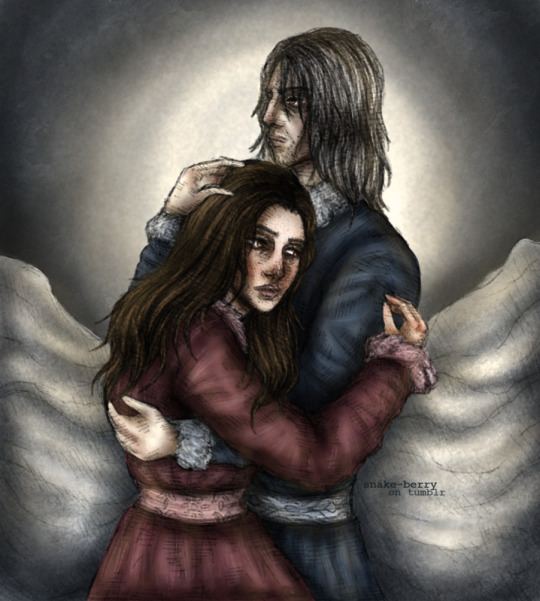
request! theon greyjoy & jeyne poole
heyyy i'm back its been a while :( life has not been v nice to me lately. but hopefully i can get back to posting! (more requests should be coming soonish so dw if you sent one, it'll happen i promise <3)
anyways this was fun to draw - still not sure how to draw jeyne and post-ramsay theon
#this isnt meant to be a canon drawing or anything just an image pulled from the depths of my imagination#so excuse the yassification#valyrianscrolls#valyrian scrolls#theon greyjoy#jeyne poole#asoiaf fanart#asoiaf art#theon x jeyne#asoiaf#theyne#a song of ice and fire#also yassified bc i cant rlly draw malnourished ppl due to undisclosed trauma#anyways yeah the bg is meant to be snow but ngl it looks ocean-adjacent
107 notes
·
View notes
Text

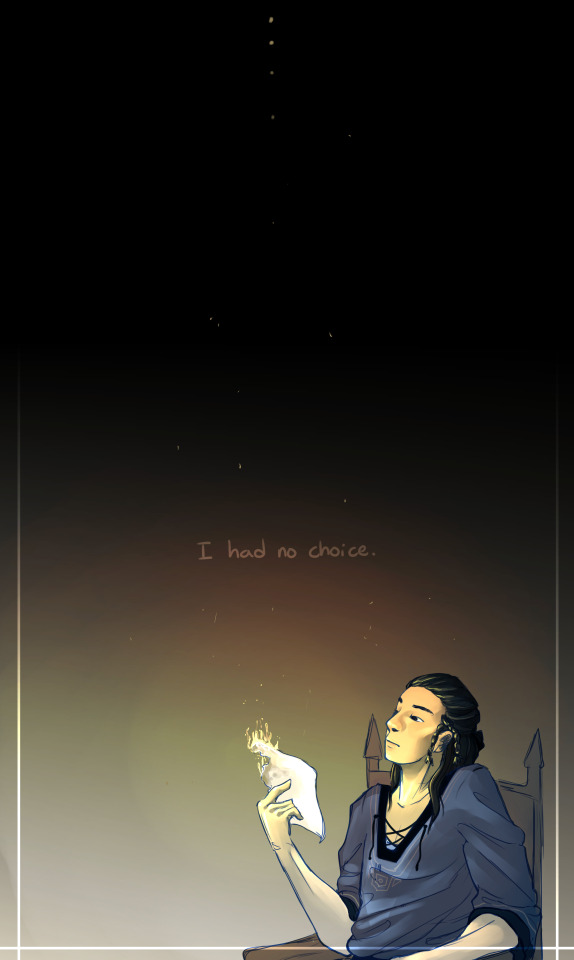
(TFW you go just a little too hard in your sexy villain era and have Some Regrets now.)
#happy throbb fortnight to all who celebrate!#asoiaf#my art#game of thrones#valyrianscrolls#fanart#theon greyjoy#robb stark#throbb#throbbfortnight#events#look i know the letter-burning scene is a show image but it's also a really fucking cool and potent image so give me a break#this piece was very impulsive and Not Planned in the slightest. i just wanted to make myself sad :)
473 notes
·
View notes
Text
From the wiki:

Something that’s been nagging at me. Theon being sexually abused is right there in the book, part of his narrative and overarching themes of identity, trauma, abuse, and cyclical violence. I always see it brought up in forums with a “possibly” in front of it. Ramsay forced Theon to preform sexual acts under horrific circumstances. In what twisted perspective is that anything besides sexual abuse? He reflects later on that night and we learn that it continued after the scene faded to black.

I wanted to post a very long notes app dissertation on this topic but I had doubts. There is a lot of meat to this. A can of worms to be opened. Feel free to contribute your thoughts though. I feel like I’m kind of odd one out feeling this way.
#I fear people just view Ramsay with evil villain guy goggles that makes them unflinching to the things he does#no Theon is not just being medieval tortured he is also being abused intimately#finally just getting this off my chest#theon greyjoy
77 notes
·
View notes
Text
GRRM on morality, heroism, villainy, and parallax in ASOIAF:
Time magazine wrote of you, “What really distinguishes Martin and what marks him as a major force for evolution in fantasy is his refusal to embrace a vision of the world as a struggle between good and evil.” Do you agree?
I think the struggle between good and evil is central to fantasy and, indeed, in some ways, central to most fiction. It's certainly a worthy subject for fiction. But I regard the struggle between good and evil as being waged within the individual human heart. […] You know, the greatest monsters of history, as we look back on them, thought they were the heroes of the story. You know, the villain is the hero of the other side, as sometimes said. That doesn't mean that it's all morally relative. That doesn't mean that all things are equally good and evil. I think there is good and there is evil in the world. But you know, it's sometimes a struggle to tell one from the other and to make the right choices. I've always been attracted to great characters, maybe because that's what I see when I look around the real world, whether I read about it in history books or the news or just people I meet. I mean, all of us have it within ourselves to be heroes. All of us have it within ourselves to be villains. We've all done good things in our lives, and most of us have also done selfish things, cowardly things, things that we're ashamed of in later years. And to my mind, that's, I don't know, the glory of the human race. We're such wonderfully contradictory, mixed-up creatures that we're endlessly fascinating to write about and read about.
via
In your work, you have essentially captured Mikhail Bakhtin's concept of polyphonic fiction, where the characters are equal, and the reader can root for any of them. This has been impossible to convey on the TV series.
I wouldn't say all the characters are equal, but they have (hopefully) human traits, especially the viewpoint characters. I have seven viewpoint characters in the first book, and each book has a few more. So, by now, we're probably up to 12 or 13 viewpoint characters, and those are the ones where I go actually inside their skin, so you're seeing the world through their eyes. You're hearing their thoughts. You're feeling their emotions. And I try to paint over those viewpoint characters, and some of them are noble and just, and some of them are kind of selfish, and some of them are very intelligent, and some of them are less intelligent and even stupid. But they're all human, and I want to portray their humanity. […] I think the battle between good and evil is fought all over the world, every day, in the individual human heart, as we all struggle with the choices that define us and define our lives. And we have to choose what we are going to do, and sometimes the choice is not easy; it's not this absolute juxtaposition of the good guys and the bad guys. And I wanted to get to that with my characters, and show some of the difficulties that they face.
via
Another element I liked about the series was the moral relativism of many of the characters. Too many Fantasies rely on the shorthand of truly evil villains in the absolute moral sense, but your characters, while they might commit terrible acts, generally do so either from short-sighted self-interest or because they truly believe they are acting for the best. Was this a deliberate decision, or is it just more interesting to write this way?
Both. I have always found grey characters more interesting than those who are pure black and white. I have no qualms with the way that Tolkien handled Sauron, but in some ways The Lord of the Rings set an unfortunate example for the writers who were to follow. […] Before you can fight the war between good and evil, you need to determine which is which, and that's not always as easy as some Fantasists would have you believe.
via
Do you purposely start a character as bad so you can later kill them?
No. What is bad? Bad is a label. We are human beings with heroism and self-interest and avarice in us and any human is capable of great good or great wrong. In Poland a couple of weeks ago I was reading about the history of Auschwitz - there were startling interviews with the people there. The guards had done unthinkable atrocities, but these were ordinary people. What allowed them to do this kind of evil? Then you read accounts of acts of outrageous heroism, yet the people are criminals or swindlers, one crime or another, but when forced to make a choice they make a heroic choice. This is what fascinated me about the human animal.
via
Martin's realm is not one of unambiguous heroes and villains. His characters, from royals to peasants, tend to be ethically mutable. So-called good people, like the noblemen Ned Stark, his son Robb Stark or the indomitable Daenerys Targaryen ("the Mother of Dragons"), make terrible mistakes - out of weakness, pride or an overly rigid sense of right and wrong. And horrible people, like Jaime Lannister, known as "the Kingslayer," do terrible things and then, over the course of several books, reveal themselves to be capable of heroism and sacrifice.
As we're discussing this in the theater, Martin quotes Shakespeare's "Julius Caesar" from memory: “The evil that men do lives after them ;/ The good is oft interred with their bones.” Then he adds his own version: “We shouldn't forget about the evil that good men do. But we shouldn't forget about the good either,” he says. “I do think a society needs heroes. They don't have to be flawless.”
via
Your books have a very strong storyline associated with the atonement of sins. For example, the way of Jaime Lannister, do you yourself believe in karma?
I don’t believe in karma per se, although sometimes I have my doubts because sometimes I think I see things that could be explained by karma. But no, I don’t really have any beliefs in the supernatural. I do believe in the possibility of redemption. And I believe that human beings, all human beings, are grey. And I try to remember that when I write my characters. We are all heroes, we are all villains, we all have the capacity for great good and we all have the capacity to do things that are selfish and evil and wrong. Sometimes it’s hard to tell the difference. In your lifetime, you can be both. And it’s making choices that defines us as human beings. There’s this sensation of compartmentalism. This eagerness to judge everybody based on the worst thing they ever did, not the best thing they ever did. And you know, I think Shakespeare in "Julius Caesar" wrote “The evil that men do lives after them ;/ The good is oft interred with their bones.” And sadly that’s true. And I think it should be the reverse. We should remember the good things and the noble things that people did, and forgive them for their failures and moments of selfishness or wrongdoing because we all have them. When we forgive them, we are essentially forgiving ourselves. Redemption should be possible.
via
Are there any characters that you've kind of fallen out of love with, that you just don't, you know, get excited about any more?
I still love all the characters. Even some of them who aren't very lovable. At least the viewpoint characters. When I'm writing in the viewpoint of one of these characters, I'm really inside their skin. So, you trying to see the world through their eyes to understand why they do the things they do. And we all have, even characters who are thought of to be bad guys, who are bad guys, in some objective sense, don't think of themselves as bad guys. […] “What evil can I do today?” Real people don't think that way. We all think we're heroes, we all think we're good guys. We have our rationalizations when we do bad things. “Well, I had no choice,” or “It's the best of several bad alternatives,” or “No it was actually good because God told me so,” or “I had to do it for my family.” We all have rationalizations for why we do shitty things or selfish things or cruel things. So when I'm writing from the viewpoint of one of my characters who has done these things, I try to have that in my head. And I do, so there's an empathy there that makes me love even people like Victarion Greyjoy, who is basically a dullard and a brute. But, he feels aggrieved and sees the world a certain way. And Jaime Lannister and Theon Greyjoy, they all have their own viewpoints. I love them all. Some I love more than others, I guess.
Who do you think to be the most important characters?
They're all important. I don't favor them, or I don't think of them in terms of importance. The viewpoint characters in the first book I have are Bran, Tyrion, Catelyn, Ned, Jon Snow, the two girls Arya and Sansa. There is the core of the Stark family plus Tyrion to represent the Lannister family. Then I have Dany on the other side of the sea, Daenerys Targaryen, whose story runs parallel and some ways doesn't connect to the others, but some day I'll eventually bring those two stories together. In each subsequent volume I drop some of my viewpoint characters and add new ones. Although the same core still dominates, the cast changes somewhat, and I like to do that. In the third volume which you haven't gotten to yet (he refers to me) I have a new viewpoint character. He's been a major character, but now you see things for the first time through his eyes. Which I think changes your perception of things somewhat. I like to play that kind of game, because we all have our own way of looking at the world. Something occurs and two people witness it. They might have very different versions of what happened, and very different explanations. I like to play with parallax in my fiction, and get different versions of the same thing.
via
A Song of Ice and Fire has much of the complex texture of authentic history, both generally and in its specific echoes of actual historical episodes. What laws and principles (if any) in your view govern human history, and how has your understanding of historical processes shaped the series?
Historical processes have never much interested me, but history is full of stories, full of triumph and tragedy and battles won and lost. It is the people who speak to me, the men and women who once lived and loved and dreamed and grieved, just as we do. Though some may have had crowns on their heads or blood on their hands, in the end they were not so different from you and me, and therein lies their fascination. I suppose I am still a believer in the now unfashionable "heroic" school, which says that history is shaped by individual men and women and the choices that they make, by deeds glorious and terrible. That is certainly the approach I have taken in A Song of Ice and Fire.
A Song of Ice and Fire undergoes a very interesting progression over its first three volumes, from a relatively clear scenario of Good (the Starks) fighting Evil (the Lannisters) to a much more ambiguous one, in which the Lannisters are much better understood, and moral certainties are less easily attainable. Are you deliberately defying the conventions and assumptions of neo-Tolkienian Fantasy here?
Guilty as charged. The battle between good and evil is a legitimate theme for a Fantasy (or for any work of fiction, for that matter), but in real life that battle is fought chiefly in the individual human heart. Too many contemporary Fantasies take the easy way out by externalizing the struggle, so the heroic protagonists need only smite the evil minions of the dark power to win the day. And you can tell the evil minions, because they're inevitably ugly and they all wear black. I wanted to stand much of that on its head. In real life, the hardest aspect of the battle between good and evil is determining which is which.
via
When you are writing the different conflicts in Westeros, do you personally pick a side? Or feel that one side fights for a more just cause than the other?
Yes, certainly. I mean, I’ve often said that I believe in grey characters, I don’t believe in black and white characters. But that’s not to say that all characters are equally grey. You know, some are very dark grey, and some are mostly white but they still have occasional flaws. I’ve always been fascinated by human beings and all of their complexity— even human beings that do appalling things, you know, the question is ‘Why?’ And it’s interesting to get inside their head and see why. Some of my viewpoint characters have done some incredibly reprehensible things: Theon, for example, or Victarion Greyjoy. Why? Were they born a monster? Weren’t they born like a cute little kid wanting to be loved and all that? We all start out that way, right? But things happen to us on the way that lead to junctures in our lives where we make decisions, and those decisions and the consequences of them color everything that comes after. You look at [historical figures] and what’s the verdict on these men? Are they heroes, are they villains? Are they great people, or people we should despise? I mean, they are fascinating characters because of their complexity.
via
“I don't concern myself over whether my characters are “likeable” or “sympathetic.” (I had my fill of that in television). My interest is in trying to make them real and human. If I can create a fully-fleshed three-dimensional character, some of my readers will like him/her, or some won't, and that's fine with me. That's the way real people react to real people in the real world, after all. Look at the range of opinions we get on politicans and movie stars. If EVERYONE likes a certain character, or hates him, that probably means he's made of cardboard. So I will let my readers decide who they like, admire, hate, pity, sympathize with, etc. The fact that characters like Sansa, Catelyn, Jaime, and Theon provoke such a wide range of reactions suggests to me that I have achieved my goal in making them human.”
via
“You want the reader to care about your characters — if they don’t, then there’s no emotional involvement. But at the same time, I want my characters to be nuanced, to be gray, to be human beings. I think human beings are all nuanced. There’s this tendency to want to make people into heroes and villains. And I think there are villains in real life and there are heroes in real life. But even the greatest heroes have flaws and do bad things, and even the greatest villains are capable of love and pain and occasionally have moments where you can feel sympathetic for them. As much as I love science fiction and fantasy and imaginative stuff, you always have to go back to real life as your touchstone and say, ‘What is the truth?’”
via
#asoiaf#valyrianscrolls#tyrion lannister#jon snow#daenerys targaryen#arya stark#sansa stark#jaime lannister#theon greyjoy#ned stark#catelyn tully#victarion greyjoy#brienne of tarth#etc#long post#sorry#some of u r very annoying when it comes to this topic#wahh wahhh full moral relativism wahhh thats not what is happening#but some of the counter compartmentalism that is obv also not the point is also obnoxious#asoiaf fans when germ deals with themes he intended to deal with: 😧#mind u he spells it out in the actual text too but whatever#ok thats my haterism for the day
356 notes
·
View notes
Text
My take on a modern Thramsay Au heueheuhue
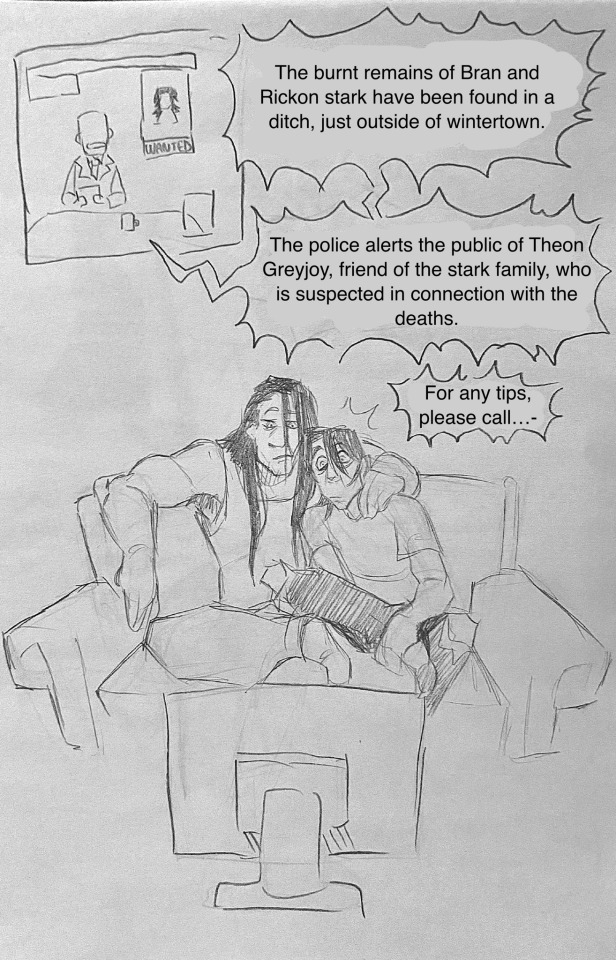
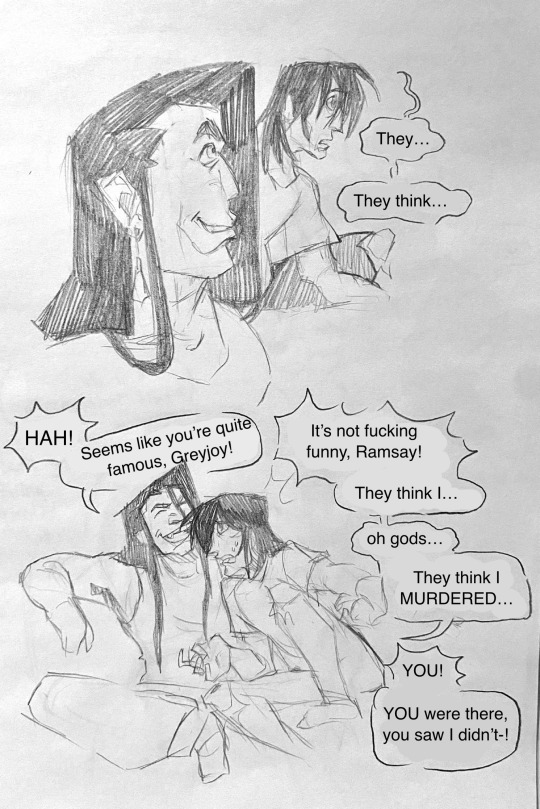
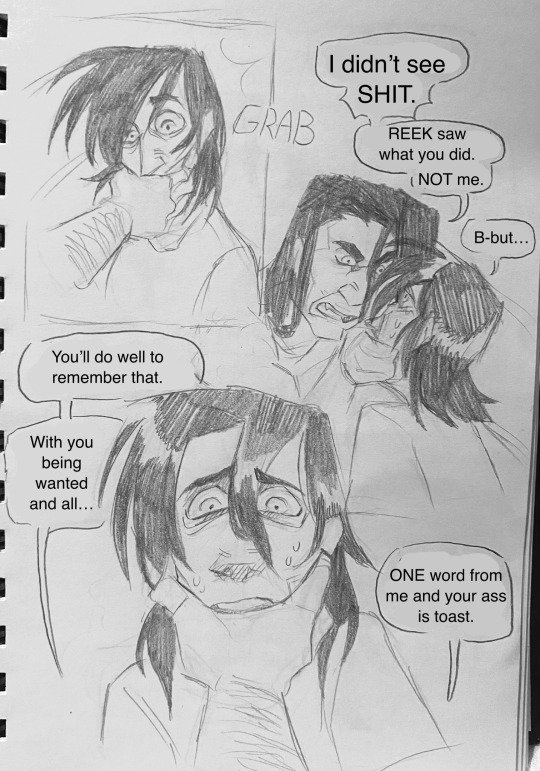
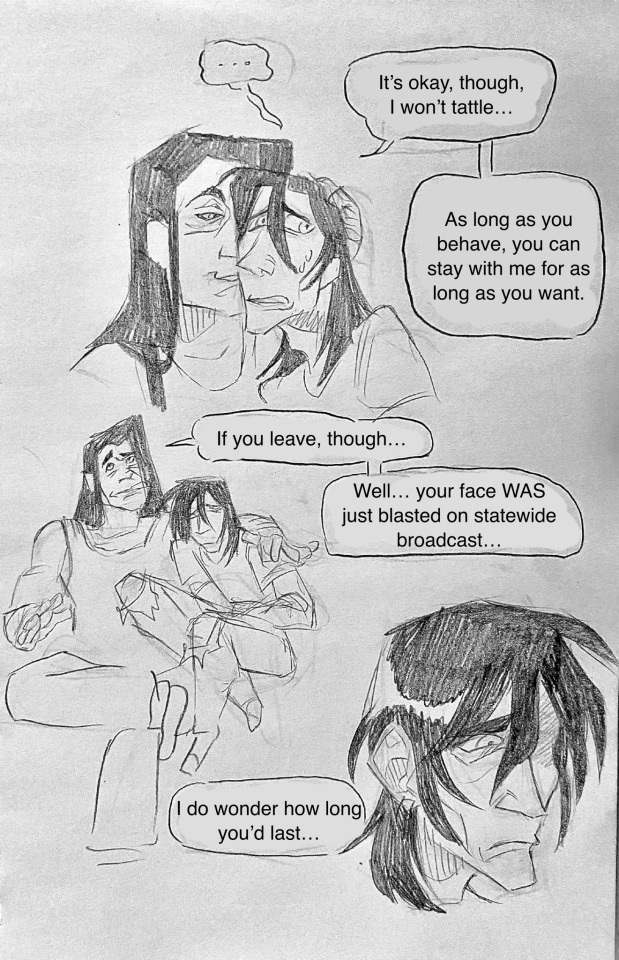
#had to repost I’m SO SORRY#game of thrones#asoiaf#thramsay#ramsay bolton#theon greyjoy#valyrianscrolls#my art#anyway I wanted to make a little less non-con version of their relationship in which theon stays BOTH because hes literally hiding from the#law but also because he does to some degree want to be WITH ramsay but the circumstances makes it more of a hostage situation than a#relationship yknow
59 notes
·
View notes
Text

nooo theon don't listen to the stinky man
bonus:
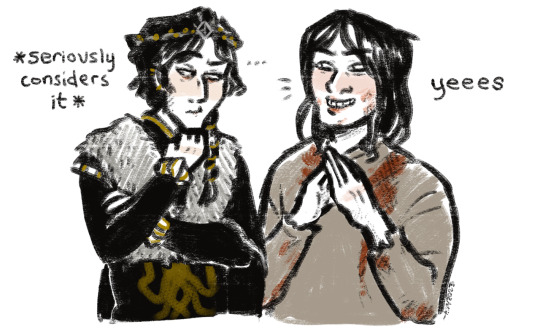
#asoiaf#asoiaf fanart#theon greyjoy#ramsay snow#ramsay bolton#whichever people use#my drawings#their dynamic in acok is so interesting (more than that in adwd imo)#bc of the impending doom of it all. ramsay playing the long game...#he gives theon bad vibes but still ends up fooling him#bc theon is in that desperate of a situation he barely has a choice#also to him he's just some smelly servant what could he even do#honestly i just love theon's acok chapters so much. his downward spiral. going from doomed to even more doomed#i have another drawing of this terrible duo i might post it later lol#don't want to inflict too much of this on anyone#acok
315 notes
·
View notes
Text
#i wanted another poll aksjdjd it’s fun!!!!#polls#getting on my soap box#it’s hard to identify problematic bc bran counts bc of the hodor situation but idt he’s on the level of theon#and also i’m not putting jaime on here he’ll sweep again aksjdjdjjd
75 notes
·
View notes
Text

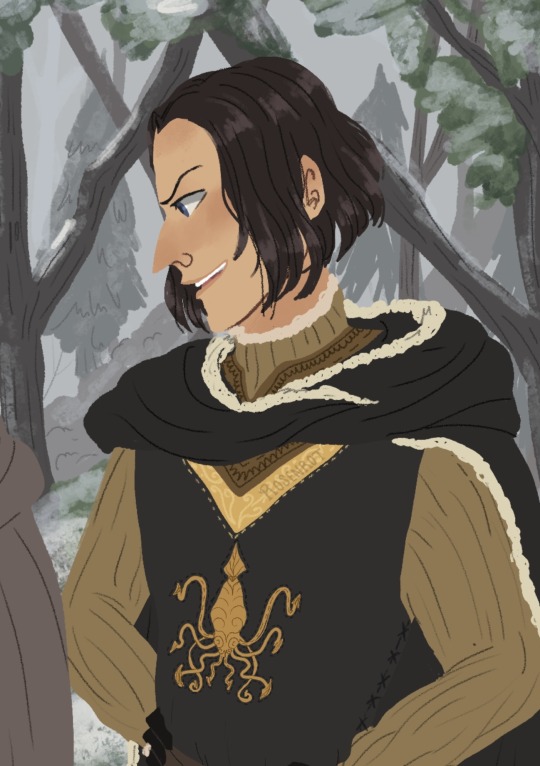

“An albino,” Theon Greyjoy said with wry amusement. “This one will die even faster than the others.”
Jon Snow gave his father’s ward a long, chilling look. “I think not, Greyjoy,” he said. “This one belongs to me.”
#90% of my Theon art is him smiling and with kraken sigil clothing#asoiaf#asoiaf fanart#fanart#illustration#house stark#robb stark#bran stark#jon snow#house greyjoy#theon greyjoy#game of thrones#valyrianscrolls#ALSO#BRAIN EMPTY SEND REQUEST#but not f&b pls
1K notes
·
View notes
Text
ok the “theon is so visibly gay he’s an easily clockable fruit and balon hates him bc he’s homophobic and hates QUEER FREAKS xD” jokes have gotten really old now i think. this is starting to remind me of the 2021 boypetwhore bit where the joke is just “x character experiences homophobic violence” and hmmmm we gotta think about that. i think it’s exploitative, offensive, not engaging with the text in any real capacity and i rly think it’s time to ask like. why is it funny for these characters to experience homophobia.
#i rly dgaf about what ppl headcanon theon’s sexuality or gender identity to be#i don’t really think about him like that#but hmmmmm i am sick of this joke#hit that NOTIFICATION BELL if you also want to stop seeing this#im making this post instead of filtering the theon tag btw#cause that’s my next resort#theon greyjoy#balon greyjoy#asoiaf#valyrianscrolls
99 notes
·
View notes